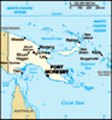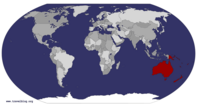Advertisement
Published: September 12th 2005
PNG News # 17: Like every Place you have never Been (Air Nuigini slogan from David Millar’s time)
(September 11, 2004)
Firstly, you need to note that the above is how people Capitalize letters here. It drives me bananas. And related to going ‘bananas’, this morning a man came to my house selling bananas from my own garden. Two trees had recently fallen due to the heavy weight of the fruit and the lack of rain. ‘Why did you take the bananas?’ ‘Because they were there.’ Any Way, back to the punctuation that thanks to sister Janet who bought me the book Eats, Shots, and Leaves, puts the whole stickler problem into perspective. But does the Panda eat bananas, you ask?
Overwhelming does not last forever. No matter how astonishing my initial contact in the land of the unexpected, in the middle of my time here, after 11 months, the unknown is astonishing me less. Right now, the fact that my source of news, CBC stands for the Catholic Bishops’ Conference instead of Canadian Broadcasting Corporation doesn’t leave me spellbound. And the idea that I can see people like this actually walking down the street (on special occasions sing
sings) doesn’t seem to faze me.
The use of the word “boss” on a management examination has got me puzzling. The linguists agree that English in PNG is a changing language that can be tailored to suit their needs. An example might be of a country Australian who does not open his mouth when he speaks his form of English because of the flies. However when the use of 'boss man’ echoes the use of 'master' and 'boss' from the colonial days, I just don’t think it is appropriate. The Nationals on the University Exam Committee don’t agree. For them they use the word, it is a form of respect.
This brings home to me that I am along way out of my element, removed from all the signs and codes by which my life’s meaning and form had been established. As you can probably tell, this week I also have the feeling that my beloved PNG is astonishing me less. I am merely whelmed and to prevent going even further down the road towards being under whelmed, on Independence Day I will travel to the Goroka Cultural Show looking for the suspended animation I experienced before.
PNG News: Is it an “In-y” or “Out-y”? September 16, 2004 Independence Day
Carol Kidu, the only woman in PNG parliament, is working tirelessly on literacy issues -especially last week’s literacy week -and there is one academic (at the front of the room) who thinks - think again. Literacy for what? Why do people need to read and write?
The father of the man who was provoking this discussion listened each time to development workers suggestions that he grow cocoa, then cobra, and then coffee. There was no economic benefit for his family. These days’ development workers are suggesting rice. And of course there was last year’s vanilla boom.
This linguist and community development worker is questioning whether people in villages should learn to read and write. In its stead how about helping villagers with their observation skills; help them to read their rivers, observe the fish and make things happen in their gardens.
He is suggesting to start from where people are. They have many strengths and we are not tapping into them. Too many new things just destroy villages. The world is re-organizing. Globalisation means cutting down trees and it means re-colonization and
it means believing other people.
He is asking, “What about operating in our own terms? We already know how to survive here. It may be limiting, it may be inward looking, but we will have more trees.”
And then there is the question of which language should be used for literacy? PNG has three languages- Pidgin, Motu and English. Literacy is no doubt useful for nation building as it allows us to give and receive complex information orally and in writing over time and space.
Is the answer from the outside or does it come from within? It is at the point of making money that the outside seems to tip the balance and require attention. People’s self confidence in their ability to sustain any new developments brought in by the outside is clearly absent. They are surrounded by failed new developments; parliament and the public sector being symbols of this failure. When I discussed this issue with students in my class- national instructors - they pointed to Japan, who are seeing the errors of their insular ways.
Tamara is the daughter of Belgium and Australian parents- I babysat her this weekend while her mom attended
the Linguist Conference. Is Tamara’s bellybutton an In-y or Out-y? Both work right (whatever a belly button is supposed to do)? Does one represent a stronger dependency attachment?
And then there is the difference between town dwellers and village folks. However village people can always go into the town. And even in town, where I live, surrounded by the educated elite with literacy standards that can always be improved. What will happen for these young people? Will they get the opportunity to use their literacy skills? Or what will Sam’s (Tamara’s brother) life be like, compared to his current mates in Madang? Will Sam live in the world, and his mates live in PNG?
PNG is celebrating 29 years of Independence this week. What does Independence mean? A celebration of the inner strength and the freedom from outer forces?
Many questions, few answers.
PNG News: What you get is what you see September 21, 2004
Goroka Cultural Show
In the Goroka Raun Raun Theatre, I attended two of the three part play documenting the history of PNG. Part Two documented the coming of the Australians, portraying them as colonizers and moviemakers. What is it
that makes me, and a bunch of other people, want to photograph our experiences? The people were, oh so polite, thanking me for taking their photos.
Asaro Mudmen move quietly through the world, however every other singsing group are drumming musicmakers.
And finally, from:
David Fickling in Port Moresby, Wednesday September 22, 2004
The Guardian In Lagos, expect chaos. There are gun battles in Bogotá. Crime has been a curse in Karachi. But there is nowhere on earth quite like this.
According to a survey by the Economist Intelligence Unit, the capital of Papua New Guinea has beaten all-comers - again - to take a title that no city on earth would covet.
With poverty, crime, poor healthcare and a rampant gang culture, Port Moresby consistently scores highest in the unit's "hardship" table, meaning it is regarded as the worst place to live among 130 world capitals. Baghdad is not on the list.
According to the unit, most aspects of daily life in Moresby are problematic.
Little bigger than Plymouth, with a population of 250,000, it is a place where murder rates are exceptionally high, thanks mainly to the "raskol" gangs that control large areas of the city.
Tales of their exploits are legion; from bank robberies with M-16 machine guns, to car holdups by mobs armed with machetes.
Rape cases are even worse: in one widely reported incident last year, an injured nurse was dragged away from a car crash to be gang-raped.
Visitors to Port Moresby are advised not to go out after sunset, and to avoid walking the streets in most areas even during the day.
The houses of the wealthy squat behind walls tipped with razor-wire and gates watched by security guards.
The precautions are necessary because a survey of international crime by the Home Office shows that the murder rate there is three times that of Moscow, and 23 times that of London.
The rates for robberies and rapes are just as dire.
But the raskols say much of the violence is meted out by the police, and that they are provoked into retaliation.
The base of Moresby's Bomai gang can be found up a dark sidestreet in the suburb of Four Mile. At the entrance to their squatter settlement a man is on guard, armed with a walkie-talkie.
"The police we know are very dangerous. They come in to the settlement and raid the people's food and property and beers," says Koiva, one of the leaders of the gang.
He has a pattern of welts on his head where he says he was beaten by a police officer with a glass bottle to extract a confession.
Another gang member, Stephen, shows two dark scars on his legs which he says were caused when he was shot in police custody.
Most people living in Port Moresby show little sympathy for the Bomai, whose raids on businesses and residential compounds have made them infamous. "Bloody raskols. Shoot first and ask questions later, that's what they should do," says an Australian expatriate.
Often, that is precisely what happens.
"I think the government are happy every time the police shoot a young man but we have thousands more youths on the streets," says Peter Gola, a former raskol working at City Mission, a charity that helps the city's street children.
Most raskols argue that their crimes are driven by the crushing poverty of life.
"We never mean to kill people," says Koiva. "We're just trying to scare them and get what we want to get."
Papua New Guinea has no welfare state, so in rural areas family and clan networks have kept people in food and lodging. That system has broken down in the capital, which sits in an arid part of the country where unemployment rates are estimated to be between 60- and 90%! (MISSING)
A kilo of rice here costs four kina - about 70p - and a tin of fish is three kina, but this is beyond the means of many families.
Most raskols say they get into crime when their parents send them out to make money. Pressured to generate an income, they turn to violence. An armed robbery can easily net more than 100,000 kina (£17,500).
"When that happens, we live like kings," says Harris, another Bomai member. "If you're lucky, you eat something good. Maybe chicken."
But there is some hope for change. Twenty minutes' drive from Moresby, City Mission's New Life farm has offered an alternative to the violence for between 5,000 and 6,000 street children since it opened 11 years ago.
The regime is strict: smoking and drinking are forbidden and there is a strong religious flavour to the instruction.
But the founder, Larry George, says the structure and respect of their new lives can work wonders.
"Most of them aren't bad kids," says Mr George. "It's mainly just poverty that's driving the crime. People can read in the papers about the government stealing millions of kina and get really frustrated."
Many of the children, he says, end up as security guards, exchanging fire with the raskols who were once their peers.
Global ranking
Best five
1= Melbourne, Australia
1= Vancouver, Canada
1= Vienna, Austria
4 Perth, Australia
5 Geneva, Switzerland
Worst five
126 Phnom Penh, Cambodia
127 Lagos, Nigeria
128 Dhaka, Bangladesh
129 Karachi, Pakistan
130 Port Moresby, Papua New Guinea
The Director of PNG Tourism Authority is on record as saying, “this is not good.”
Advertisement
Tot: 0.128s; Tpl: 0.013s; cc: 8; qc: 49; dbt: 0.0494s; 1; m:domysql w:travelblog (10.17.0.13); sld: 1;
; mem: 1.1mb












